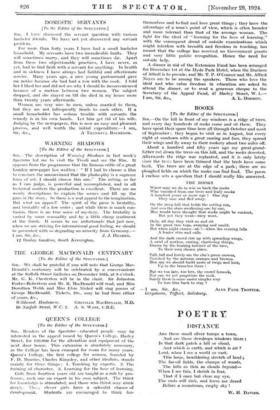ROOKS
[To the Editor of the SPECTATOR.] Sia,—On the hill in front of my windows is a ridge of trees. and every day hundreds of rooks come and sit there. They have spent their spare time here all through October and most of September ; they began to visit us in August, but every night at sundown with a great cawing and fuss, they spread their wings and fly away to their rookery about two miles off.
About a hundred and fifty years ago my great-grand- father cut down the trees on this hill, and the rooks deserted. Afterwards the ridge was replanted, and it is only lately since the trees have been thinned that the birds have come back. The trees are at the edge of a park ; there are no ploughed fields on which the rooks can find food. The poem I enclose sets a question that I should really Bice answered.
THE ROOKS WHAT may we do to win us back the rooks Who vanished from our trees and leafy nooks A hundred years or more ago ? One day They rose and fled away.
On the steep hill that holds the setting sun, And sees the stars awakening one by one, Men would have thought that rooks might be content, But yet they went—they went.
Only, all day they visit us and sit In the great tree tops, swaying and sunlit.
But when night comes—ah !—when the evening falls A leader stirs and calls.
And the dark crowd rise up with spreading wings, A swirl of restless, cawing, chattering things, Drawn by the homing instinct of the race, To their own chosen place.
Tall, tall and lovely are the elm's green crowns, Touched by the autumn oranges and browns. Men say we should build nests of twigs and hair, Up in the branches there !
But we too late, too late, the crowd forsook, Nor can we yet propitiate the rook. Surely there is some easier simpler way To lure him back to stay ?
Greystones, Teffont, Salisbury.


























































 Previous page
Previous page